Select Language
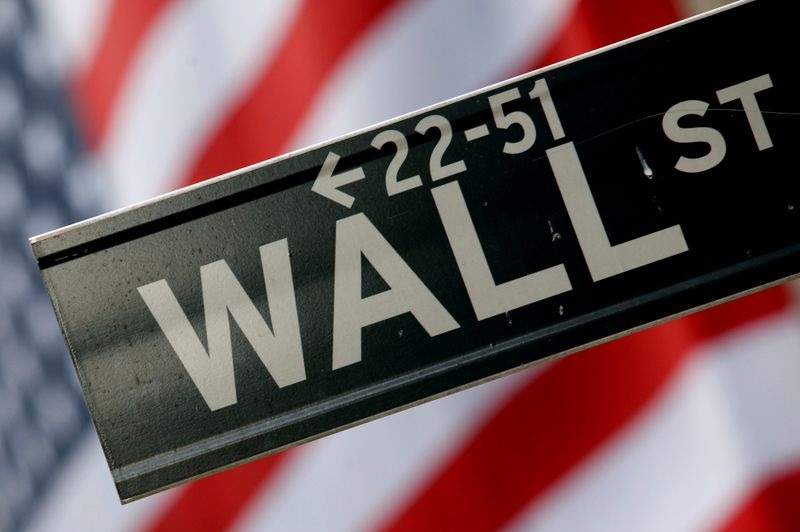
U.S. stock index futures fell modestly Monday pre-market trading after Wall Street rallied sharply on dovish comments from Federal Reserve Chair Jerome Powell, which heralded interest rate cuts in the near-term.
Focus this week is squarely on earnings from artificial intelligence major NVIDIA Corporation (NASDAQ:NVDA), for more cues on the fast-growing industry.
Wall Street rallied on Friday, reversing a bulk of recent losses as investors ratcheted up bets that the Fed will cut interest rates in September.
S&P 500 Futures were down 0.24% to 6,451.25 points, while Nasdaq 100 Futures fell 0.32% to 23,424 points by 06:17 ET (10:17 GMT). Dow Jones Futures were seen down by 0.22% trading at 45,532.0 points.
Powell signals potential rate cut, Wall St rallies
Powell, speaking at the Jackson Hole Symposium on Friday, said the central bank could possibly cut rates in September amid increasing risks to the labor market.
But the Fed Chair warned that the decision was not set in stone, especially as risks from inflation remained. Fed policymakers have repeatedly cited uncertainty over the inflationary impact of President Donald Trump’s trade tariffs.
Still, Powell’s comments were relatively dovish when compared to recent signaling from the Fed, and saw markets ramp up bets on a September rate cut. Wall Street indexes also rose sharply following his comments, reversing most of last week’s losses.
The S&P 500 rose 1.5% to 6,466.91 points on Friday. The NASDAQ Composite rose 1.9% to 21,496, while the Dow Jones Industrial Average rose 1.9% to a record-high 45,631.74 points. The US Small Cap 2000 surged 3.9% on Friday after Powell’s speech.
"Small Caps run the risk of seeing only a short-lived outperformance trade once again, particularly if the economic concerns that appeared open the door for a September cut ultimately come to fruition," RBC strategist Lori Calvasina wrote in a note.
Markets are now pricing in a ~89% chance of a 25bp rate cut in September, followed by a 49% chance of another 25bp cut in December.
Nvidia awaited for more cues on AI
Focus this week is squarely on second-quarter earnings from AI major NVIDIA Corporation (NASDAQ:NVDA), which are due on Wednesday.
The company is widely regarded as a bellwether for AI demand, and is expected to mostly log another strong quarter.
But focus will be on the company’s China sales, which are likely to have fallen further amid brief U.S. export curbs and increased Chinese scrutiny towards AI chips. Nvidia was seen halting production of its China-specific H20 chip last week.
Nvidia’s earnings also come following an extended rout in tech shares, as investors questioned just how profitable the AI industry will remain in the coming quarters.
Outside Nvidia, Dell Technologies Inc (NYSE:DELL), Dick’s Sporting Goods Inc (NYSE:DKS), Best Buy Co Inc (NYSE:BBY), Dollar General Corporation (NYSE:DG), and Abercrombie & Fitch Company (NYSE:ANF) are also set to report earnings this week.
Second-quarter gross domestic product data is also on tap this week, coming after preliminary data released in late-July showed strong growth.

U.S. stock futures slipped slightly lower Friday amid caution ahead of Fed chair Jerome Powell’s speech at the Jackson Hole symposium later in the session. Meta signs a huge deal with Google, which the production of key Nvidia chips are in doubt.
1. Powell to speak
U.S. Federal Reserve Chair Jerome Powell is scheduled to speak later in the session at the central bank’s Jackson Hole symposium - the week’s highlight as investors look for clues over the path of interest rates for the rest of the year.
Expectations of an interest rate cut in September soared at the start of the month in the wake of a surprisingly soft payrolls, but these bets have dropped significantly over the past week, ensuring volatility as he speaks.
Last week, traders were pricing in a 99 percent chance of a 25 bps rate cut at the next Fed meeting. That is now down to 71.5 percent, according to Investing.com’s Fed Rate Monitor Tool.
The drop was caused largely by hotter-than-expected producer inflation data, but hawkish comments from Fed members have also contributed.
Kansas City Fed President Jeffrey Schmid, a voting member, said the central bank isn’t rushing to cut interest rates, pointing to inflation still running above its 2% target and a resilient labor market.
Separately, Cleveland Fed President Beth Hammack, a non-voting member, voiced concern Thursday that stubborn inflation may rule out an interest-rate cut in September.
Powell’s speech comes amid market concerns of stagflation, a combination of sluggish growth and sticky inflation that could limit the Fed’s ability to ease monetary policy.
The Fed chair could also use the opportunity to speak about the importance of the central bank’s independence, given the extent of criticism from the Trump administration, and from the president in particular.
Earlier this week, Trump urged Fed Governor Lisa Cook to resign over mortgage allegations raised by one of his political allies, intensifying his effort to gain influence over the U.S. central bank.
2. U.S. futures fall ahead of Powell
U.S. stock futures slipped lower Friday, with investors awaiting Fed chair Jerome Powell’s speech at the Jackson Hole symposium for clues over the future path of monetary policy.
At 03:00 ET (07:00 GMT), the S&P 500 futures traded 7 points, or 0.1%, lower Nasdaq 100 futures dropped 60 points, or 0.3%, and Dow futures fell 20 points, or 0.1%.
The major indices closed lower Thursday, with the broad-based S&P 500 posting a fifth straight day of declines.
As of Thursday’s close, all three major averages were headed for a losing week. The S&P 500 is off 1.2% week to date, the NASDAQ Composite is down 2.4% and the Dow Jones Industrial Average is on pace for a 0.4% slide.
Investors are cautious ahead of Powell’s speech at the Fed’s annual economic symposium in Wyoming, hoping to gain clarity on the interest rate outlook.
On the corporate front, both Intuit (NASDAQ:INTU) and Zoom (NASDAQ:ZM) will be in the spotlight after the companies posted results after the close Thursday.
3. Nvidia stopping H20 chip production?
Nvidia (NASDAQ:NVDA) has asked some of its component suppliers to stop production related to its made-for-China H20 general processing units, according to reports, as Beijing makes life difficult for the American chip giant.
Reuters reported that Nvidia has asked Foxconn (SS:601138) to suspend work on the H20 AI chip, the most advanced product the U.S. company is currently permitted to sell to China.
At the same time, The Information detailed that Nvidia has asked Arizona-based Amkor Technology (NASDAQ:AMKR), which handles the advanced packaging of the company’s H20 chips, and South Korea’s Samsung Electronics (KS:005930), which supplies memory for them, to halt production.
Nvidia was summoned to a meeting with the Cyberspace Administration of China last month, and asked to provide information on the chips as Beijing has raised concerns that they could contain certain tracking technology, allowing them to be operated remotely.
Nvidia only resumed sales of the H20 in July after being forced to halt shipments in April due to U.S. restrictions.
"We constantly manage our supply chain to address market conditions," Nvidia said in a statement, declining to elaborate further.
4. Meta signs deal with Google
Meta Platforms (NASDAQ:META) has signed a $10 billion deal with Alphabet’s (NASDAQ:GOOGL) Google, the Information reported, which will see the Facebook owner use Google Cloud’s servers, storage, and other services over the next six years.
Meta, along with Wall Street’s so-called AI Hyperscalers, is racing to build superintelligent AI amid growing calls from investors for returns on the hundreds of billions of dollars poured into AI development.
The company raised the bottom end of its annual capital expenditures forecast by $2 billion, to a range of $66 billion to $72 billion last month.
Meta is seeking outside partners to help it fund the massive infrastructure needed to power AI by offloading $2 billion in data center assets, the company disclosed in a filing earlier this month.
5. Crude set for weekly gains
Oil prices edged higher Friday, on track to snap a two-week losing streak, amid increasing signs that peace negotiations between Russia and Ukraine were stalling.
At 03:00 ET, Brent futures gained 0.1% to $67.68 a barrel, and U.S. West Texas Intermediate crude futures rose 0.1% to $63.59 a barrel.
Both contracts climbed more than 1% in the prior session. Brent has risen 3% this week, while the WTI has gained around 1.4%.
The three-and-a-half-year war in Ukraine continued unabated on Thursday, and traders are pricing in more risk that the supply of Russian crude to the global market remains disrupted.
Oil prices were also supported by a larger-than-expected drawdown from U.S. crude stockpiles in the last week, indicating strong demand.

U.S. stock futures stagnated Thursday as investors awaited the start of the Federal Reserve’s Jackson Hole symposium later in the session, as well as the release of more labor market data. Retail giant Walmart also offers up its latest quarterly results, a widely-watched gauge of the health of the U.S. consumer.
1. Jackson Hole symposium starts
The U.S. Federal Reserve’s highly anticipated Jackson Hole symposium kicks off later Thursday, with central bankers from around the world gathering in Wyoming to discuss monetary policy.
The highlight is likely to be Jerome Powell’s speech on Friday - his last one at the annual gathering as Fed chairman - with investors searching for hints for a September cut after expectations soared in the wake of a surprisingly soft payrolls at the start of the month.
“Powell’s reaction function to recent stagflationary data will be key,” said analysts at Bank of America, in a note. “Will he be spooked by jobs revisions or lean into the labor supply slowdown?”
Market-implied odds of a quarter-point cut on September 17 currently stand at 80%, down from 84% a day ago.
Powell could also use his speech to guide how his tenure is recorded in the history books, particularly given the severe criticism leveled at him by President Donald Trump for refraining from rate cuts this year.
Trump’s growing influence over the direction of monetary policy, a potential threat to the independence of the central bank, has been an issue for the markets of late.
The president’s most recent target has been Fed Governor Lisa Cook, with Trump demanding her resignation over allegations made by one of his political allies about mortgages she holds in Michigan and Georgia.
2. U.S. futures steady ahead of jobless claims
U.S. stock futures traded in tight ranges Thursday ahead of the release of key labor market data as well the start of the Federal Reserve’s Jackson Hole symposium.
At 03:00 ET (07:00 GMT), the S&P 500 futures traded just 1 point, or 0.1%, lower, Nasdaq 100 futures gained 12 points, or 0.1%, and Dow futures rose 50 points, or 0.1%.
The major indices closed in a mixed fashion Wednesday, with the Dow Jones Industrial Average eking out a small gain while the S&P 500 and the Nasdaq Composite closed lower. This meant a four-day losing streak for the broad-based S&P 500 as tech names weighed heavily.
The minutes from the last Fed policy meeting indicated that the majority of policymakers still remained concerned about the labor market and inflation, as the two who dissented against the U.S. central bank decision’s to leave interest rates unchanged last month appear not to have been joined by other policymakers.
"Almost all participants viewed it as appropriate to maintain the target range for the federal funds rate at 4.25% to 4.50% at this meeting," the minutes of the July 29-30 meeting said.
Weekly jobless claims are due later in the session, and are expected to show a small increase in the number of Americans claiming unemployment benefits for the first time.
Existing home sales for July and the Philadelphia Fed’s business index are also due for release, while the Fed’s Jackson Hole symposium starts later in the day [see above].
3. Walmart reports Q2 results
Walmart (NYSE:WMT), the world’s largest retailer by sales, headlines the earnings slate Thursday, reporting its second-quarter results before markets open and providing a barometer on the health of the U.S. consumer.
Investors and analysts expect the retailer to report earnings of 74 cents a share, up nearly 11% from a year ago, and revenue of $176.16 billion, up 4%.
Sales fell slightly short of expectations in Walmart’s last quarter, but July’s retail sales report bolstered confidence in current spending trends.
Walmart’s low-price model and dominance in grocery can help it weather economic storms better than others. The world’s largest retailer by sales has surpassed earnings estimates for 11 consecutive quarters, according to LSEG data, sending its valuation soaring even as other consumer staples companies have struggled this year.
That said, Walmart’s management could strike a cautious tone on customer demand as the U.S. labor market cools and inflation ticks up, especially given the uncertainty surrounding the possible impact of the Trump administration’s tariffs policies.
The week has seen a number of big-box retailers reporting. Home Depot (NYSE:HD) started the ball rolling on Tuesday, while Target (NYSE:TGT) tumbled on Wednesday after the company named insider Michael Fiddelke as CEO and retained annual forecasts that were lowered in May.
4. Meta pauses spending on AI recruitment
Has the artificial intelligence craze run its course, or just pausing from breath?
Meta Platforms (NASDAQ:META) confirmed late Thursday a Wall Street Journal report that it has paused hiring for its new artificial intelligence division, ending a spending spree that saw it spend fortunes on a wave of AI researchers and engineers.
The Facebook owner is a member of the group of Wall Street’s so-called AI Hyperscalers, a bracket of tech megacaps spending hundreds of billions of dollars on developing new AI models and building more data center capacity.
Meta by itself has earmarked as much as $72 billion on AI spending this year.
A Meta spokesperson said that the pause was simply “some basic organizational planning: creating a solid structure for our new superintelligence efforts after bringing people on board and undertaking yearly budgeting and planning exercises.”
However, this trend of outsized capital spending has grown into a major investor concern in recent weeks, with shareholders questioning whether increased expenses and the stock-based compensations offered by Meta stood to hurt overall returns on investing in the company.
A report from the Massachusetts Institute of Technology, released earlier this week, claimed that 95% of AI ventures remained unprofitable, adding to the doubts over the extent of the AI spending.
5. U.S. demand boosts crude prices
Oil prices rose Thursday, adding to recent gains and buoyed by signs of resilient demand in the U.S., the world’s largest consumer of energy.
At 03:00 ET, Brent futures gained 0.3% to $67.30 a barrel, and U.S. West Texas Intermediate crude futures rose 0.8% to $63.22 a barrel.
Both contracts climbed over 1% in the prior session.
U.S. crude inventories fell by 6 million barrels last week, the U.S. Energy Information Administration said on Wednesday, while gasoline stocks dropped by 2.7 million barrels, both more than expected.
This indicated steady driving demand during the peak summer travel season, helping offset some concerns about global economic uncertainty.
Traders are also keeping an eye on developments in the search for a peace deal in Ukraine, expecting oil prices to fall once a peace deal is reached.
That said, the drawn-out efforts to secure peace in Ukraine mean Western sanctions on Russian oil supply remain in place, and that the possibility of tougher sanctions and more tariffs on Russian oil buyers still hangs over the market.

U.S. stock futures slipped lower Wednesday ahead of the release of the minutes from the last Federal Reserve policy meeting. Target heads up a deluge of earnings from the important retail sector, while semiconductors will also be in the spotlight as the U.S. government weighs up taking stakes in the sector. Tesla CEO Elon Musk is also reportedly shelving his political ambitions.
1. Fed minutes could show divisions
Federal Reserve Chair Jerome Powell is set to speak at the Jackson Hole symposium at the end of the week, but investors may not have to wait until then for clues about the central bank’s next move as the minutes of the last meeting are due later in the session.
The Fed has maintained its policy rate in the 4.25%-4.50% range for all of this year, with some policymakers, and Powell in particular, expressing worries that the Trump administration’s tariffs could reignite inflation.
However, this stance has resulted in severe criticism from President Donald Trump, and some Fed officials have recently broken ranks, calling for lower interest rates.
These minutes could show how deep divisions run after Governors Christopher Waller and Michelle Bowman dissented at the last meeting, marking the first time two voting Fed officials have done so since 1993.
Investors and economists are betting the Fed will cut rates by a quarter of a percentage point next month with perhaps another reduction of similar size to come later in the year.
The annual Jackson Hole gathering kicks off with informal interviews ahead of the formal agenda release Thursday evening. Powell’s key address on Friday morning will focus on the economic outlook.
2. U.S. futures fall ahead of Fed minutes
U.S. stock futures slipped lower Wednesday, with investors cautiously awaiting the release of minutes from the last Federal Reserve policy meeting as well as earnings from a number of major retailers.
At 03:00 ET (07:00 GMT), the S&P 500 futures traded 12 points, or 0.2%, lower Nasdaq 100 futures dropped 75 points, or 0.3%, and Dow futures fell 85 points, or 0.2%.
The major indices closed in a mixed fashion Tuesday, with the S&P 500 falling 0.6% and the NASDAQ Composite dropping 1.5%, while the Dow Jones Industrial Average closed marginally higher.
Investors are likely to trade in a cautious manner Wednesday ahead of the key release of minutes from the last Fed policy meeting [see above] as they seek clues about future monetary policy ahead of the Federal Reserve’s Jackson Hole symposium later in the week.
There are also more quarterly earnings due from a number of major retailers, including Target [see below], Lowe’s and TJX before the bell.
U.S. companies have posted their strongest earnings beats in more than three years during the second quarter, according to an analysis by Jefferies, adding that the “difference between actual & consensus earnings growth is 12.3%, the widest spread since 1Q’22.”
3. U.S. government looking at semiconductor equity stakes
The U.S. government is weighing taking equity stakes in semiconductor firms receiving CHIPS Act subsidies to build factories in the country, according to a Reuters report.
Apart from Intel (NASDAQ:INTC), Commerce Secretary Howard Lutnick is also exploring deals with Micron Technology (NASDAQ:MU), Taiwan Semiconductor Manufacturing (NYSE:TSM) and Samsung (KS:005930) that would see Washington secure ownership interests in return for billions in grants, the report said.
The move would mark a historic shift in U.S. industrial policy, giving the government direct influence over companies key to national security. The White House has already confirmed talks with Intel on a potential 10% stake.
Washington last year allocated $6.6 billion to TSMC, $6.2 billion to Micron and $4.75 billion to Samsung, according to the report.
4. Target’s results in spotlight
Target (NYSE:TGT) heads the earnings flow Wednesday, as the focus remains on the retail sector this week, with reports due from a host of big-box retailers and home improvement chains.
The struggling retailer reports fiscal second-quarter earnings before the bell, with investors looking for signs that it is getting back on track given annual sales have been roughly stagnant for about four years.
Wall Street expects the big-box retailer to report earnings per share of $2.03 and revenue of $24.93 billion for the last quarter, according to a survey of analysts by LSEG.
“We see increasing longer-term sales and margin risks for Target given slowing digital sales growth, a lack of scale in digital advertising and third-party marketplace, elevated tariff, pricing and merchandising headwinds, and increasing competitive threats from Walmart (NYSE:WMT) and Amazon (NASDAQ:AMZN),” analysts at Bank of America said, in a note late last week.
Investors will also look for what the retailer says regarding tariffs, as Target’s imports account for roughly 50% of its cost of goods sold, versus Walmart’s 33%.
Home Depot (NYSE:HD) was the first of the major big-box retailers to report this week, with the U.S. home-improvement chain keeping its annual forecasts intact despite posting muted quarterly results on Tuesday.
Earnings are also due from Lowe’s Companies (NYSE:LOW) and TJX Companies (NYSE:TJX) before the open.
5. Musk shelving political ambitions - WSJ
Elon Musk is quietly shelving his plans to start a political party, according to a report in the Wall Street Journal, a move that will likely be welcomed by Tesla (NASDAQ:TSLA) shareholders.
The Tesla CEO had in July said he would start a new party, called the America Party, to represent voters unhappy with both the Republicans and the Democrats.
This followed a major falling out with U.S. President Donald Trump, largely over Musk’s criticism of Trump’s “big beautiful bill,” which he claimed would undermine his efforts to cut government spending as part of the Department of Government Efficiency.
However, Musk has since made few actual moves towards establishing the third party, and the WSJ reported Musk as telling allies that he wants to focus his attention more on his companies, and is reluctant to alienate powerful Republicans .
Any sidelining of Musk’s political ambitions is expected to offer some relief to Tesla shareholders, who had grown increasingly concerned that he was becoming distracted from his responsibilities at the electric car-maker.

U.S. stock futures slipped slightly lower Tuesday ahead of the release of the earnings from big-box retailer Home Depot , as well as comments from Fed officials. The search for peace in Ukraine continues after talks between U.S. President Donald Trump and Ukrainian President Volodymyr Zelensky, while Palo Alto impresses with its new forecasts.
1. Trump-Zelensky meet in Washington
The quest for peace in Ukraine continues after U.S. President Donald Trump and Ukrainian President Volodymyr Zelensky met on Monday in Washington.
The meeting to discuss an end to the longstanding conflict between Russia and Ukraine ended with both sides appearing optimistic about the future, a sharp contrast to the shouting match that marred the previous gathering of the two presidents.
Trump said that the U.S. would help guarantee Ukraine’s security, but did not specify the terms of any guarantees. This followed a Financial Times report suggesting that Ukraine could offer to buy $100 billion of U.S. weapons, funded by European aid, to get the said guarantees.
Trump also raised the possibility of trilateral talks, also including Russian President Vladimir Putin, following a meeting with Putin in Alaska last week.
Still, a peace deal appears far from imminent, especially given that Putin has shown little indication of agreeing to a ceasefire.
The most significant sticking point is the land that Russia has occupied in fighting, which Ukraine wants back. The Russian leader reportedly wants Ukraine to hand over the remainder of the Donbas region to Moscow to end the war, something Zelensky will be very reluctant to do.
2. U.S. futures slip slightly
U.S. stock futures edged slightly lower Tuesday, with investors cautious ahead of the release of key retail earnings as well as speeches from Federal Reserve officials.
At 02:45 ET (06:45 GMT), the S&P 500 futures traded 10 points, or 0.2%, lower Nasdaq 100 futures dropped 45 points, or 0.2%, and Dow futures fell 50 points, or 0.1%.
The major indices closed Monday mixed after trading in tight ranges, as investors await the start of the Federal Reserve’s Jackson Hole symposium later in the week, looking for clues from Chair Jerome Powell as to what will happen at the central bank’s remaining policy meetings this year.
Fed Governor Michelle Bowman, one of two dissenting voices favouring a rate cut at last month’s meeting, is due to speak later today.
Markets are indicating an 83% chance for a quarter-point rate cut at the Fed’s next policy meeting in September.
On the earnings front, investors will be keeping tabs on reports from a host of big-box retailers and home improvement chains, starting later in the session with results from Home Depot (NYSE:HD).
Investors will also keep an eye on data on housing starts and building permits for July, for clues about the health of the housing market.
3. Home Depot heads up major retailers’ earnings
The retail sector takes center stage on Wall Street this week, with reports due from a host of big-box retailers and home improvement chains.
Home Depot starts the ball rolling later in the session, to be followed as the week progresses with numbers from peers such as Lowe’s (NYSE:LOW), Target (NYSE:TGT), and Walmart (NYSE:WMT).
The figures could present a fresh take on the state of the American consumer heading into the second half of the calendar year.
Home Depot is likely to report a 5.1% jump in revenue for its second quarter ending July, compared to a 0.6% rise last year, data compiled by LSEG showed.
However, tariffs remain a wild card, even if Home Depot sources more than half its goods from within North America. The retailer has touted plans to further diversify its supply chain, and said on last quarter’s earnings call it would not raise prices due to tariffs - but that some items could disappear altogether.
4. Palo Alto impresses with healthy forecast
Palo Alto Networks (NASDAQ:PANW) reported strong quarterly results after the close on Wall Street Monday, while the cybersecurity company also offered up a positive fiscal 2026 forecast, betting on growing demand for its artificial intelligence-powered cybersecurity solutions.
Its stock soared 5% in premarket trading.
The company has been benefiting from an AI-driven upgrade cycle as enterprises accelerate their cloud adoption and modernize security operations amid rising data breach incidents.
A wave of high-profile cyberattacks has hit a number of global companies, prompting the need for robust security solutions.
The company projected annual revenue between $10.48 billion and $10.53 billion, above analysts’ average estimate of $10.43 billion, according to data compiled by LSEG.
It expects adjusted profit per share of $3.75 to $3.85, above estimates of $3.67 for the fiscal year.
Palo Alto Networks also said its founder and chief technology officer Nir Zuk has retired after more than 20 years. Chief Product Officer Lee Klarich will take over as CTO and join the board.
5. Crude falls on increased peace hopes
Oil prices fell Tuesday as traders assessed the potential for three-way talks to end the war in Ukraine, which would likely lead to the lifting of sanctions on Russian crude.
At 02:45 ET, Brent futures slipped 0.4% to $66.35 a barrel, and U.S. West Texas Intermediate crude futures fell 0.4% to $62.44 a barrel.
Both contracts rose nearly 1% on Monday after U.S. Trade Adviser Peter Navarro criticized India’s purchases of discounted Russian crude as funding the war, renewing supply flow worries.
Following talks between Trump and Zelensky in Washington, the U.S. president floated the possibility of a subsequent three-way discussion, including Russia’s Vladimir Putin, keeping alive hopes for a pathway to negotiations.
“There was no critical breakthrough. It appears the next step is a meeting between Zelensky and Putin, possibly within two weeks,” ING analysts said in a note.
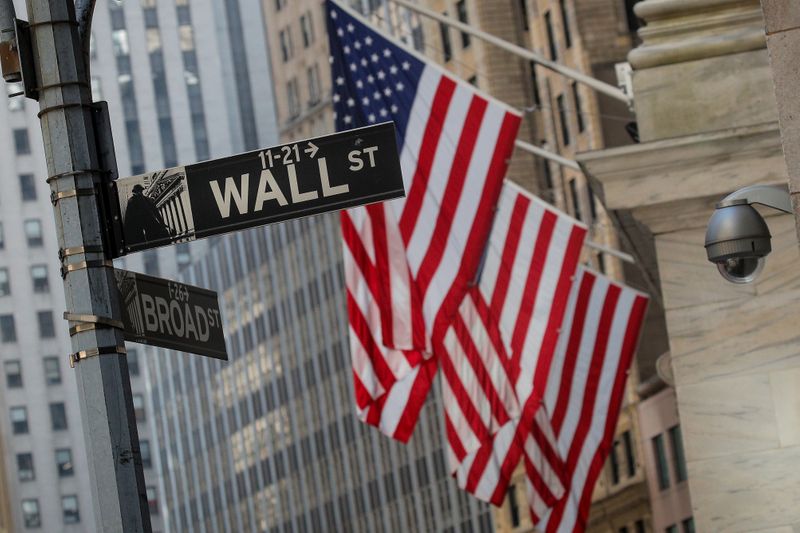
U.S. stocks traded mostly unchanged Monday, pausing for breath after a positive week as investors awaited a meeting between Ukraine President Volodymyr Zelensky and U.S. President Donald Trump in Washington as well as the upcoming Jackson Hole Symposium.
At 09:35 ET (13:35 GMT), the Dow Jones Industrial Average fell 20 points, or 0.1%, the S&P 500 index slipped 3 points, or 0.1%, while the NASDAQ Composite gained 10 points, or 0.1%.
The main Wall Street indices notched their second straight positive week last week, with the blue-chip Dow Jones Industrial Average joined the benchmark S&P 500 and tech-heavy Nasdaq Composite in reaching a new all-time peak during the week.
Zelensky heads for Washington
Zelensky is due to meet with Trump in Washington on Monday in a bid to arrange the outlines of a potential peace deal.
He is likely to come under pressure to agree to a deal, with reports suggesting that a possible agreement could involve Ukraine relinquishing swathes of its eastern region, including Donetsk and Luhansk to Russia, while the Kremlin will withdraw from Southern regions of Kherson and Zaporizhzhia.
Zelensky, who will be flanked by leaders from a host of European countries, has said he supports a "swift and reliable" termination to the more than three-year-old conflict, but said Russia must be willing to end the war "it started."
Trump said on Sunday that Zelensky could end the war with Russia ‘almost immediately’ by acquiescing to Moscow’s demands.
Jackson Hole awaited for more rate cues
The main economic focus this week is squarely on Federal Reserve Jerome Powell’s speech at the Jackson Hole symposium on Friday, which is expected to provide more cues on interest rates.
Powell’s address comes amid growing conviction that the Fed will cut interest rates by 25 basis points in September, especially following soft payrolls and consumer inflation readings for July. Investors are pricing in a 83% chance for a 25 bps cut in September, CME Fedwatch showed.
Strong producer inflation data released last week largely ruled out the chances of a bigger cut.
Walmart, Target to round off Q2 earnings
A host of major retailers are set to report their second-quarter earnings this week, rounding off a mostly positive reporting season.
{{7997|Walmart (NYSE:WMT)}} and {{8180|Target (NYSE:TGT)}} will be the most closely watched, with other major retailers including {{8064|Home Depot (NYSE:HD)}}, Lowe’s Companies Inc (NYSE:LOW), and {{8227|TJX Companies (NYSE:TJX)}} also on tap.
The earnings will provide more insight into the U.S. consumer, amid some concerns that President Donald Trump’s tariffs will chip away at private spending.
About 90% of S&P 500 companies have reported June quarter earnings so far, with 81% of the ones that reported logging stronger-than-expected prints, data from FactSet showed.
Other majors reporting this week include Workday (NASDAQ:WDAY), {{941155|Alibaba (NYSE:BABA)}}, {{6378|Baidu (NASDAQ:BIDU)}}, {{41268|Palo Alto Networks Inc (NASDAQ:PANW)}} and {{7869|Analog Devices (NASDAQ:ADI)}}.
Elsewhere, Tesla (NASDAQ:TSLA) stock fell after The Times newspaper reported that the electric vehicle manufacturer was offering discounts of up to 40% on leased vehicles in the U.K..
Novo Nordisk (CSE:NOVOb) gained strongly after the drugmaker’s Wegovy obesity drug was granted accelerated approval from the U.S. Food and Drug Administration for the treatment of a serious liver disease.
Crude slips lower
Oil prices slipped marginally Monday, adding to last week’s losses, as concerns over Russian supply receded following last week’s meeting between Trump and Putin.
At 09:35 ET, Brent futures slipped 0.1% to $65.76 a barrel, and U.S. West Texas Intermediate crude futures fell 0.1% to $61.91 a barrel.
Both contracts fell nearly 1.5% on Friday, and ended with sharp weekly losses before the U.S.-Russia meeting concluded.
Trump decided against exerting any further pressure on Russia to end the Ukraine war through measures to disrupt its oil exports following his meeting with Putin on Friday.
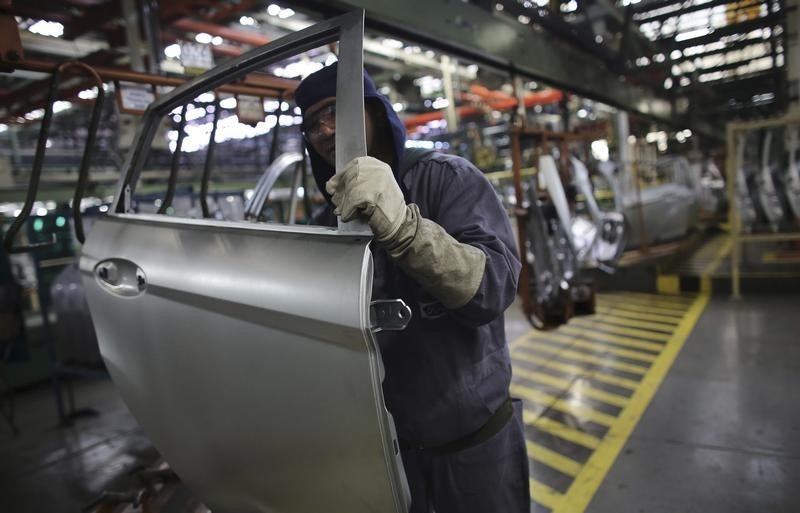
U.S. producer prices rose at a faster-than-anticipated rate in July as a tariff-fueled jump in goods was joined by the biggest advance in the cost of services in more than three years, muddying the outlook for a possible upcoming Federal Reserve interest rate cut.
A chunk of the 1.1% jump in the index for final services demand for the month was fueled by a rise in expenses for machinery and equipment wholesaling, according to figures from the Bureau of Labor Statistics. The indices for portfolio management, securities brokerage, traveler accommodation, and freight transportation also advanced.
Final demand goods, meanwhile, moved up by 0.7%, the largest increase since January, with roughly a quarter traced back to higher prices for fresh and dry vegetables. Prices for gasoline, on the other hand, decreased.
Stripping out volatile items like food and fuel, the measure rose by 0.4%, after a 0.9% gain in June, while a climb in passenger car costs eased to 0.1% from 0.3%. But home electronic equipment costs surged by 5% versus the prior month, while sporting and athletic items -- seen as particularly exposed to elevated U.S. levies -- increased by 1.2%
Analysts had been curious to see if goods inflation, especially for items like furniture, apparel and toys that are viewed as susceptible to the duties, would be offset by what have been recently muted services costs.
The producer price index for final demand increased by 0.9% on a monthly basis in July, accelerating after it was unchanged in June. In the twelve months to July, the figure came in at 3.3%, speeding up from 2.4%. It was the largest such uptick since February.
Economists had predicted readings of 0.2% and 2.5%, respectively.
"July PPI came in hot," said Kathy Jones, Chief Fixed Income Strategist at Charles Schwab, in a post on X. Jones noted that Treasury yields are up "as the Federal Reserve needs to weight this against a softening labor market."
A weak July jobs report, as well as tepid consumer price data released earlier this week, have spurred on expectations that the Fed will slash borrowing costs at its September meeting. It would be the first drawdown by the central bank since it paused its policy easing cycle last December.
Investors have been widely pricing in a 25-basis point reduction after the Fed’s September 16-17 gathering. Treasury Secretary Scott Bessent, meanwhile, has called for an even deeper half-point cut due partially to sharp downward revisions in job growth in June and May.
In a note, analysts at Capital Economics estimated that, with the consumer price data and PPI in hand, the core personal-consumption expenditures deflator is now at 0.32% month-over-month, "implying that the three-month annualized rate jumped back up to 3.2%, from 2.7%." The Fed factors in these numbers as it deliberates over policy actions.
"Nonetheless, with almost 0.1%-point of the monthly gain reflecting the one-off surge in the portfolio management PPI, it probably won’t have much influence on the Fed’s decision on whether to cut in September," said Stephen Brown, Deputy Chief North America Economist at Capital Economics.
Brown added that the "more concerning development" revolves around indications that "services prices might be accelerating."
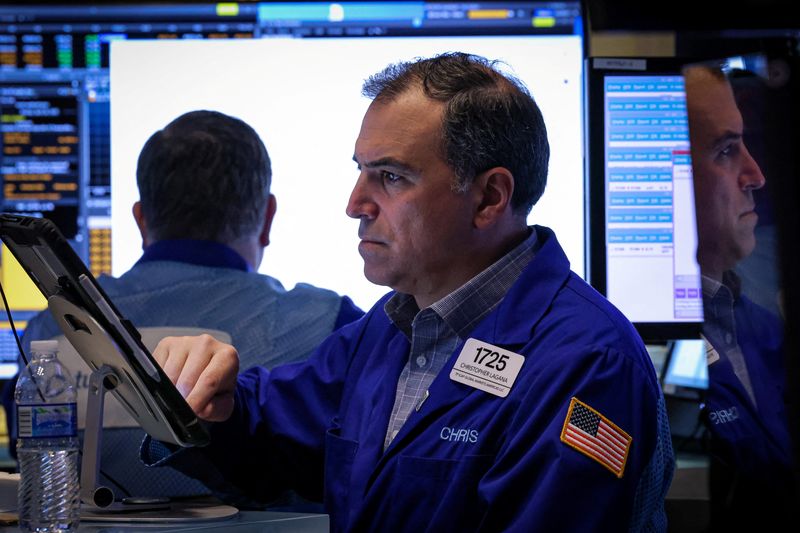
1. Futures rise
Futures contracts linked to the largest U.S. indices rose, pointing to an extension in gains logged in the prior session that were fueled by muted inflation figures.
By 03:36 ET (07:36 GMT), the S&P 500 futures contract had advanced by 33 points, or 0.5%, and Nasdaq 100 futures had climbed by 264 points, or 1.1%, and Dow futures had gained 49 points, or 0.1%.
All three of the major averages on Wall Street rallied by more than 1% on Tuesday, spurred on by data showing that headline year-over-year consumer price growth in July matched the preceding month. The numbers bolstered wagers that the Federal Reserve will cut interest rates at its upcoming meeting next month, with officials at the central bank seen opting to prioritize supporting a flagging labor market over still above-target price gains.
"Inflation was broadly in line with expectations as tariffs continue to be largely absorbed within U.S. corporate profit margins. This gives the Fed the room to respond to the weaker jobs backdrop," analysts at ING said in a note.
Both the benchmark S&P 500 and tech-heavy Nasdaq notched fresh record closing highs, while yields on short-dated U.S. Treasuries -- which are particularly sensitive to rate expectations -- dipped. Yields tend to move inversely to prices.
2. Cisco to report
On the earnings calendar, Cisco Systems is set to kick off a string of releases from companies whose reporting quarter finished at the end of July.
The results, due out after the closing bell, are anticipated to beat expectations thanks partially to "general strength" in Cisco’s firewalls business and cybersecurity subscribers, according to analysts at Piper Sandler.
"Cisco is still experiencing net-momentum into the second half, with early networking prints a good signal for the space and 2026 likely a good refresh period," the analysts led by James Fish wrote.
They added that Cisco’s fiscal year 2026 guidance will be "key," particularly after Mark Patterson replaced Scott Herren as the firm’s finance chief. Herren, who retired in July, is leaving after Cisco raised its fiscal 2025 results outlook, banking on artificial intelligence helping to sustain demand from cloud customers for its networking equipment.
Observers also noted that the contribution of Splunk (NASDAQ:SPLK), the cybersecurity group Cisco bought for $28 billion in 2024, will now be folded into the company’s organic numbers. The transaction was the largest in Cisco’s history and reflected a push to more deeply integrate AI into its operations.
3. Perplexity’s $34.5 bn bid for Google’s Chrome
Perplexity AI has put forward a $34.5 billion unsolicited all-cash offer to buy Alphabet-owned Google’s Chrome brower, marking a push by the startup to harness the data needed to train its AI model from the service’s billions of users.
The news comes as Google faces a legal battle over antitrust concerns surrounding its all-important search business.
Last year, a U.S. judge ruled that Google had spent billion of dollars to illegally create a monopoly that made it the world’s dominant search engine. The decision cleared the way for a number of potential fixes, including the breaking up of Alphabet (NASDAQ:GOOGL) through a sale of Chrome. Such a move could fundamentally alter the world of online advertising that has long been a centerpiece of Google’s operations.
Perplexity, which previously submitted a bid for TikTok US as the short-form video app dealt with concerns in Washington around its Chinese ownership, did not disclose how it plans to fund its bid. The firm was last valued at $14 billion, and has raised roughly $1 billion in backing from investors like SoftBank (TYO:9984) and Nvidia (NASDAQ:NVDA).
4. Ether near all-time peak
Bitcoin gained slightly, while Ether hovered around record highs as cryptocurrency markets rallied on the mild U.S. consumer inflation data.
Ether also surged amid a flurry of buying as corporate entities stockpile the world no. 2 cryptocurrency in a manner similar to Bitcoin. The digital token rose as much as 8.5% to $4,683.0, coming within touching distance of a $4,861 record high hit in November 2021.
Several U.S.-listed companies outlined plans to increase their Ether holdings this week amid growing adoption of a Bitcoin buying strategy popularized by Michael Saylor’s Strategy.
The world’s biggest corporate Bitcoin holder, Strategy has raised billions of dollars through share issuances, which it has then largely used to fund Bitcoin purchases over the last two years.
5. Gold inches higher
Gold prices pushed up in early European trading, supported by hopes for Fed policy easing, while investors also looked ahead to U.S.-Russia talks due later this week.
Spot gold had risen by 0.3% to $3,359.54 an ounce, while gold futures for December climbed by 0.3% to $3,408.22/oz by 03:35 ET.
Following Tuesday’s muted inflation figures, markets are now pricing in a more than 96% probability of a September cut, according to CME’s FedWatch Tool. Lower interest rates reduce the opportunity cost of holding non-yielding assets such as gold, making bullion more attractive to investors.
However, gold’s advance was tempered by geopolitical developments, with traders closely watching Friday’s summit between U.S. President Donald Trump and Russian President Vladimir Putin in Alaska.
The meeting will focus on the war in Ukraine, and market participants are weighing the possibility of proposals for a ceasefire.
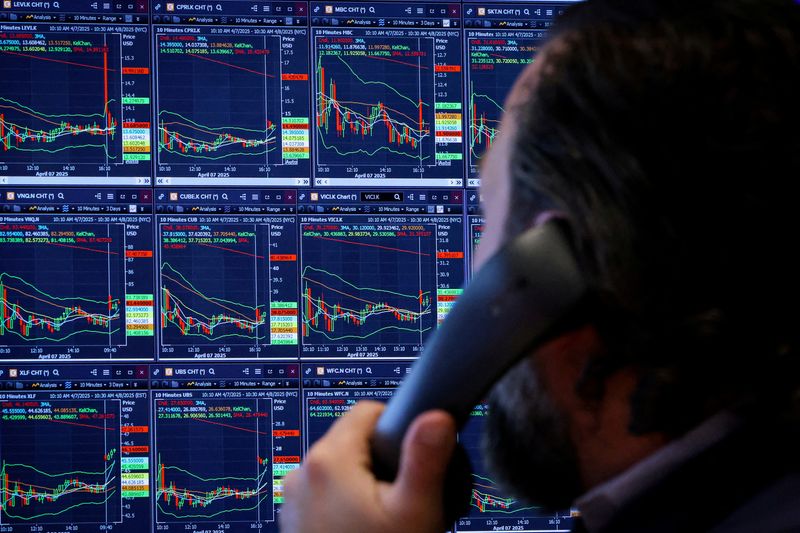
U.S. stock futures are mixed ahead of the publication of crucial inflation data that could offer more clarity around the Federal Reserve’s interest rate trajectory. Meanwhile, the current chief economist of the conservative think tank Heritage Foundation is tapped to be the new commissioner of the U.S. Bureau of Labor Statistics, just days after the former head was dismissed following a weak jobs report. Elsewhere, billionaire Elon Musk accuses Apple (NASDAQ:AAPL) of favoring OpenAI’s ChatGPT on its App Store over a model from his artificial intelligence start-up xAI.
1. Futures mixed
U.S. stock futures hovered around both sides of the flatline on Tuesday, as investors geared up for the release of key inflation data.
By 02:58 ET (06:58 GMT), the Dow futures contract had risen by 75 points, or 0.2%, S&P 500 futures had dipped by 7 points, or 0.1%, and Nasdaq 100 futures had slipped by 38 points, or 0.2%.
The main averages on Wall Street slipped in the prior session, with markets assessing a reported move by semiconductor majors Nvidia (NASDAQ:NVDA) and Advanced Micro Devices (NASDAQ:AMD) to agree to grant the U.S. government a 15% cut of their artificial intelligence chip sales to China. Shares of both firms were choppy, ending down by 0.35% and 0.28%, respectively, as observers flagged that the levy could dent their margins and establish a precedent allowing the White House to tax critical exports.
Traders also seemed to shrug at President Donald Trump’s announcement of a 90-day extension to a trade truce between the U.S. and China, analysts at Vital Knowledge said, adding that the outcome was "widely expected." The detente struck earlier this year was due to expire on Tuesday.
2. CPI ahead
Economic data is once again set to be in the spotlight, with the latest monthly consumer price index due out on Tuesday.
The closely-monitored gauge of inflation is expected to accelerate slightly to 2.8% in the twelve months to July, and cool to 0.2% month-over-month. Stripping out volatile items like food and fuel, so-called "core" CPI is tipped to speed up to 3.0% year-over-year and 0.3% on a monthly basis.
Analysts anticipate that the Federal Reserve’s interest rate decision next month could be swayed in part by the latest numbers.
Following a weak July jobs report and sharp downward revisions to the readings for June and May, bets have risen that the central bank will slash borrowing costs by 25 basis points at its upcoming gathering in September. As a result, any indication that inflation is either in-line or below projections could further bolster these wagers.
However, signs of hotter-than-estimated price gains may give policymakers some pause, particularly as the Fed has recently adopted a more cautious attitude to rate cuts partially due to worries that Trump’s aggressive tariff agenda could drive up inflation. The stance has drawn the ire of Trump, who has called for immediate and deep drawdowns, while dissent to the "wait-and-see" approach was notable in the Fed’s last policy decision in July.
3. Trump nominates new BLS head
Swirling around the inflation numbers will likely be fresh questions around the reliability of government data, especially after Trump fired the commissioner of the Labor Department’s Bureau of Labor Statistics in the wake of last month’s soft jobs report.
Without providing evidence, Trump accused the head of BLS, Erika McEntarfer, of doctoring the figures to damage him politically.
On Monday, Trump said he had nominated economist E.J. Antoni as McEntarfer’s replacement. The Senate must still confirm the appointment.
Antoni holds a doctoral degree in economics and has previously been an outspoken critic of the BLS, which is charged with collecting and publishing numbers on the world’s largest economy that are tracked by investors, companies and policymakers alike.
Trump wrote on his social media platform that "E.J. will ensure that the Numbers released are HONEST and ACCURATE."
Yet analysts quoted by Reuters have noted some reservations around Antoni, who is currently the chief economist of the conservative think tank Heritage Foundation. They added that there may be an increase in demand for private-label data as a result of the nomination.
4. Musk threatens Apple with legal action
Elon Musk accused Apple’s App Store of engaging in anticompetitive behavior, saying his artificial intelligence startup xAI will take “immediate legal action” over what he described as favoritism toward OpenAI’s ChatGPT.
In posts on his social media platform X late on Monday, Musk said Apple’s practices “make it impossible for any AI company besides OpenAI to reach #1 in the App Store, which is an unequivocal antitrust violation."
The Tesla (NASDAQ:TSLA) CEO questioned why X and xAI’s chatbot app Grok were absent from Apple’s “Must Have” section despite, as he claimed, being the world’s top news app and the fifth-ranked app overall, respectively.
“Are you playing politics? What gives?” Musk wrote, also alleging that ChatGPT appears “in every list where (Apple has) editorial control.”
OpenAI CEO Sam Altman responded on X, saying, “This is a remarkable claim given what I have heard alleged that Elon does to manipulate X to benefit himself and his own companies and harm his competitors and people he doesn’t like.”
5. RBA rate decision
The Reserve Bank of Australia slashed interest rates as expected and signaled that it will likely ease monetary policy further as officials gauge possibly cooling inflation in the country.
Tuesday’s cut to the RBA’s benchmark rate to 3.60% from 3.85% is the third such move this year. It previously kicked off the easing cycle in the first quarter.
The RBA said that slowing inflation will likely spur more rate cuts. It also lowered its outlook for economic growth in 2025, which it now sees falling below 2%.

Lingering in the background this week is a highly-anticipated meeting between U.S. President Donald Trump and Russian counterpart Vladimir Putin on Friday, with the two expected to discuss a potential Ukraine peace plan. On the trade front, a fragile tariff truce between the U.S. and China is due to expire on August 12, with no sign having yet emerged of a possible extension to their agreement.
Meanwhile, the Bank of Canada will unveil a summary of its latest gathering on Wednesday. Two weeks ago, the central bank left interest rates steady, but signaled a willingness to cut rates should there be a weakening in the Canadian economy and inflation pressures remain muted.
Futures tick up
U.S. stock index futures edged marginally higher, pausing for breath after the previous week’s sharp gains, with investors awaiting key inflation prints due later in the week.
At 06:55 ET, Dow Jones Futures traded 108 points higher, or 0.3%, S&P 500 Futures gained 7 points, or 0.1%, and Nasdaq 100 Futures were mostly unchanged.
The tech-heavy Nasdaq Composite jumped on Friday, closing at a fresh all-time high, helped by Apple’s stock price surging by more than 13% last week -- its largest weekly gain since 2020. The other averages also gained last week.
CPI leads data deluge this week
This broadly positive tone on Wall Street faces the test of key economic data this week, with the focus on the release of U.S. consumer price data for July on Tuesday.
A separate gauge of producer prices for final demand is due out on Thursday, while a metric of American retail sales and a survey of consumer sentiment are expected to be published on Friday.
The weak July jobs report at the start of the month, which also included a sharp downward revision to the numbers for June and May, has increased expectations that the Federal Reserve will cut interest rates next month.
Along with the labor market, inflation remains the other crucial pillar of the Federal Reserve’s two-pronged mandate, and it remains stubbornly elevated above the Fed’s stated 2% target. Additionally, the tariffs that the Trump administration has increased on imports from a number of trading partners are expected to lift domestic prices.
“Consensus is expecting another acceleration in core CPI, to 0.3% month-on-month (3.0% year-on-year), in this week’s July print,” said analysts at ING, in a note. “That is a number that can probably be seen as acceptable for the Federal Reserve to proceed with a September cut, given the backdrop of a significantly weaker jobs market.”
Nvidia/AMD to pay U.S. government for China sales?
Corporate earnings results for the second quarter have generally been better than expected, and investor reactions to these results have been more outsized than usual, possibly indicating that markets are homing in more on individual company performances than broader economic trends, according to analysts at Barclays (LON:BARC).
The earnings slate is largely empty Monday, but eyes will be on Nvidia (NASDAQ:NVDA) and Advanced Micro Devices (NASDAQ:AMD) after media reports suggested both chipmakers are set to pay the U.S. government 15% of the returns they make from the sale of its artificial intelligence to China.
Shares of C3.ai (NYSE:AI) were sharply lower in extended hours trading after the enterprise AI application software group issued a disappointing preliminary earnings announcement.
Crude stable ahead of Ukraine talks
Oil prices stabilized, after last week’s selloff ahead of scheduled talks between the U.S. and Russia later this week on the war in Ukraine.
At 06:56 ET, Brent futures edged higher to $66.71 a barrel, and U.S. West Texas Intermediate crude futures added 0.1% to $63.97 a barrel.
Both benchmarks fell by more than 4% last week as traders digested the news that Trump will meet Russian President Vladimir Putin on August 15 in Alaska to negotiate an end to the war in Ukraine.
Expectations have risen for a potential end to sanctions that have limited the supply of Russian oil to international markets.
Gold eases
Gold prices retreated, adding to the losses seen at the end of last week, as traders looked ahead to the Trump-Putin summit.
Trump’s deadline last Friday for Russia to strike a peace deal with Ukraine passed without stricter U.S. sanctions imposed on Moscow, and this has helped ease tensions. Demand for safe-haven gold was dented, as a result.
"But with Russia demanding that Ukraine cede occupied territory to end the war, it’s difficult to see a quick solution," said analysts at ING, in a note. "It’s unlikely that Ukraine will agree to give up its own territory."
At 07:00 ET, Spot Gold fell 1.2% to $3,358.80 an ounce and Gold Futures for December dropped 2.2% to $3,413.20/oz.

